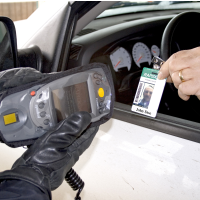Navy’s Failed Access Control System: Is Cronyism To Blame?
 RAPIDGate at work (photo: Fort Bragg Paraglide, Flickr)
RAPIDGate at work (photo: Fort Bragg Paraglide, Flickr)
The mass shooting on September 16 at the Washington Navy Yard by a contractor has, ironically, cast light on possible contract fraud related to the Navy’s Commercial Access Control System, which eases access for those who visit often but don’t qualify for government credentials. Known as RAPIDGate, the system now is operational at more than 150 facilities around the country, including the Navy Yard.
That’s because within 24 hours of the shooting, the Office of Inspector General (IG) of the Department of Defense (DoD) was forced to release a scathing audit report (pdf) of RAPIDGate that urged the Navy to scrap the system at once. The report found that at 9 of the 10 facilities audited, temporary passes were issued before completing background checks, and that the actual checks were inadequate because they relied on public records. As a result, at least 52 felons got free access for up to three years, which “placed military personnel, dependents, civilians, and installations at an increased security risk.”
The report also pointed out that “the costs associated [with RAPIDGate]…are unknown but could be exorbitant,” and that irregularities in the contract award process mean that “the Navy has not had valid contractual coverage” since 2011 and may have paid $1.1 million for “unallowable costs” related to it. Problems like these will require additional digging into the contractor and any subcontractors.
The contractor, Oregon-based Eid Passport, Inc., whose board of directors is packed with ex-military brass and civilian officials—including ex-Homeland Security Secretary Tom Ridge, former Commandant of the Coast Guard Adm. Thomas H. Collins and former Commander of U.S. Northern Command USAF Gen. Ralph Eberhart—was the 15th fastest growing security company in 2013.
Back in 2012, before the DOD-IG began its audit, company CEO Steve Larson boasted to The Oregonian newspaper that the board members, “have been just overwhelmingly phenomenal at getting us in, opening doors and that sort of thing.” Company revenues increased six-fold from 2008 to 2011.
But was it more than just opening doors? The report criticizes the Navy for evading competition in awarding the contract to Eid Passport. For example, the RAPIDGate kiosks that visitors use were priced at $2,499 each—exactly $1.00 less than the amount that Navy rules required “open market” competition. In response to complaints, the subscriptions were renewed and expanded at a cost of millions of dollars, under unusual subcontracts that also circumvented federal rules.
Eid Passport is raking in $53 million per year for its Navy work, according to a Navy estimate cited in the IG report, but inspectors also discovered that contractors were covering their fees by boosting their overhead costs and other expenses paid by the Navy. It found $1.2 million in such expenses was reimbursed to companies such as Goodwill Industries, DynCorp International, BAE Systems, and Huntington Ingalls.
Sen. Claire McCaskill (D-Missouri), who requested the report in response to a whistleblower complaint about Eid Passport’s contract in June 2012, said in a statement that the report’s findings were “deeply concerning,” and endorsed the program’s immediate cancellation.
“This program wasted money, allowed dozens of felons access to installations they should never have had, and utterly lacked competent oversight,” McCaskill said in a written statement. “It’s clear that its existence constitutes an unnecessary danger to the Navy and its personnel.”
-Matt Bewig
To Learn More:
Audit Reveals Widespread Problems in Security System Used by the Navy (by Rebecca LaFlure, Center for Public Integrity)
Navy Commercial Access Control System Did Not Effectively Mitigate Access Control Risks (U.S. Department of Defense Inspector General) (pdf)
52 Convicted Felons Had Routine Access to U.S. Naval Facilities (by Noel Brinkerhoff and Danny Biederman, AllGov)
- Top Stories
- Unusual News
- Where is the Money Going?
- Controversies
- U.S. and the World
- Appointments and Resignations
- Latest News
- Trump to Stop Deportations If…
- Trump Denounces World Series
- What If China Invaded the United States?
- Donald Trump Has a Mental Health Problem and It Has a Name
- Trump Goes on Renaming Frenzy






Comments